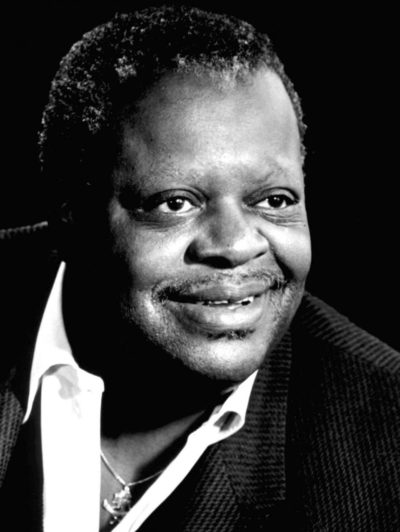Oscar Peterson (Oscar Emmanuel Peterson)

Oscar Peterson was born to immigrants from the West Indies; his father worked as a porter for Canadian Pacific Railway. Peterson grew up in the neighbourhood of Little Burgundy in Montreal, Quebec. It was in this predominantly black neighbourhood that he found himself surrounded by the jazz culture that flourished in the early 20th century. At the age of five, Peterson began honing his skills with the trumpet and piano. However, a bout of tuberculosis when he was seven prevented him from playing the trumpet again, and so he directed all his attention to the piano. His father, Daniel Peterson, an amateur trumpeter and pianist, was one of his first music teachers, and his sister Daisy taught young Oscar classical piano. Young Oscar was persistent at practicing scales and classical études daily, and thanks to such arduous practice he developed his virtuosity. As a child, Oscar Peterson also studied with Hungarian-born pianist Paul de Marky, a student of István Thomán, who was himself a pupil of Franz Liszt, so his training was predominantly based on classical piano. Meanwhile, he was captivated by traditional jazz and learned several ragtime pieces and especially the boogie-woogie. At that time Peterson was called “the Brown Bomber of the Boogie-Woogie”.
At the age of nine Oscar Peterson played piano with control that impressed professional musicians. For many years his piano studies included four to six hours of practice daily. Only in his later years did he decrease his daily practice to just one or two hours. In 1940, at fourteen years of age, Peterson won the national music competition organized by the Canadian Broadcasting Corporation. After that victory, he dropped out of school and became a professional pianist working for a weekly radio show, and playing at hotels and music halls. Some of the artists who influenced Peterson’s music during the earlier type of years were Teddy Wilson, Nat “King” Cole, James P. Johnson and Art Tatum, to whom many tried to compare Peterson in later years. One of his first exposures to Tatum’s musical talents came early in his teen years when his father played a recording of Tatum’s “Tiger Rag” for him, and Peterson was so intimidated by what he heard that he became disillusioned about his own playing, to the extent of refusing to play the piano at all for several weeks. In his own words, “Tatum scared me to death”, and Peterson was “never cocky again” about his mastery at the piano. Tatum was a model for Peterson’s musicianship during the 1940s and 1950s. Tatum and Peterson eventually became good friends, although Peterson was always shy about being compared with Tatum and rarely played the piano in Tatum’s presence.
Oscar Peterson also credited his sister—a piano teacher in Montreal who also taught several other Canadian jazz musicians—with being an important teacher and influence on his career. Under his sister’s tutelage, Peterson expanded into classical piano training and broadened his range while mastering the core classical pianism from scales to preludes and fugues by Johann Sebastian Bach. Building on Tatum’s pianism and aesthetics, Peterson also absorbed Tatum’s musical influences, notably from piano concertos by Sergei Rachmaninoff. Rachmaninoff’s harmonizations, as well as direct quotations from his 2nd Piano Concerto, are thrown in here and there in many recordings by Peterson, including his work with the most familiar formulation of the Oscar Peterson Trio, with bassist Ray Brown and guitarist Herb Ellis. During the 1960s and 1970s Peterson made numerous trio recordings highlighting his piano performances that reveal more of his eclectic style that absorbed influences from various genres of jazz, popular and classical music. Peterson’s health declined rapidly in 2007. He had to cancel his performance at the 2007 Toronto Jazz Festival and his attendance at a June 8, 2007, Carnegie Hall all-star performance in his honour, owing to illness. On December 23, 2007, Peterson died of kidney failure at his home in Mississauga, Ontario. He left seven children, his fourth wife Kelly, and their daughter, Céline (born 1991).
Born
- August, 15, 1925
- Canada
- Montreal, Quebec
Died
- December, 23, 2007
- Canada
- Mississauga, Ontario
Cause of Death
- kidney failure
Cemetery
- Saint Peter's Anglican Church Cemetery
- Erindale, Ontario
- Canada



